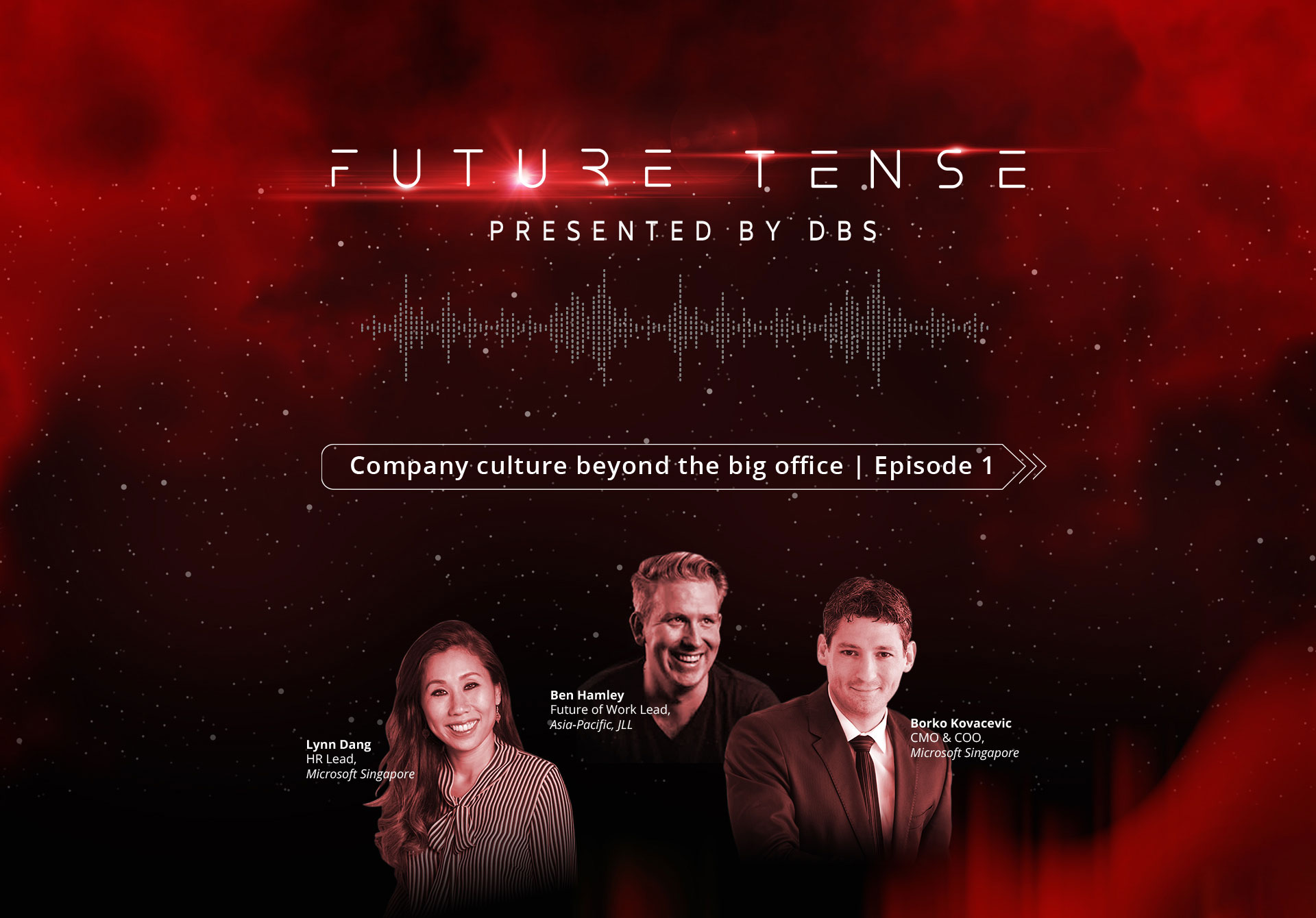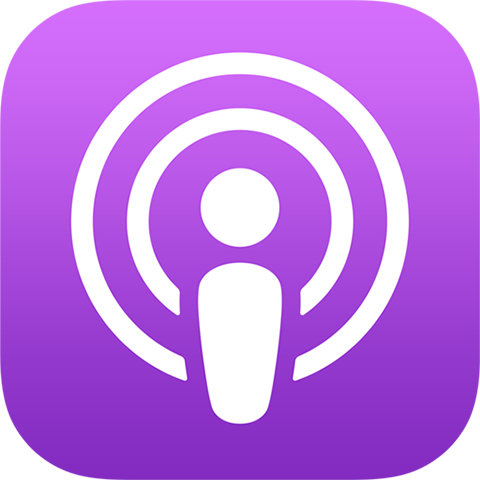Listen to this story
00:00
20:23
In brief:
-
Even as remote work becomes the norm, this doesn’t spell the end of the big office.
-
Workplaces are expected to become more fluid, diverse and flexible.
-
New organisational design and functions might emerge to navigate the changing dynamics between employees and the company.
-
Culture, connectivity, purpose are crucial elements.
-
AI is helping us look at how technology can augment humanity, making us more productive and bringing the experience closer to what we are used to with physical interactions.
Subscribe to our podcast:
Welcome to Future Tense, by DBS. We look at what's to come for Asia and the world as technology evolves at an accelerating pace. We get you comfortable with the future as business leaders tackle big questions about sustainability, innovation, fintech and more.
2020 will forever be synonymous Covid-19, a global pandemic that will shift the way a whole generation lives and works. At the recent DBS Asian Insights Conference, a biannual affair held virtually for the first time this year, Piyush Gupta, CEO of DBS said this,
“It seems to be quite clear that there is no going back. The future will be different. But what is less clear is whether this is truly the end of the big office. … I think the psychology of people, the idea of culture, the idea of how do you get alignment at scale, might lead to a situation where you have greater flexibility, but the office space does not necessarily vanish.”
– Piyush Gupta, DBS CEO
So, how then can we expect offices to change? And with that, what happens to the crucial elements, such as culture, that make up a company?
Our host speaks to Microsoft and JLL to gather their thoughts on the future of work.
Carolyn: I'm Carolyn Camoens. As a communicator, creative and conversationalist, I'm extremely curious about the trends shaping our future and what the years ahead hold for us. And in this series, I'll get to ask questions of the people driving the changes.
Today we're talking about the future of work. While we were seeing some shifts in the way companies and employees approach the work culture, driven largely by mobility trends and the sudden surge in flexible workspaces such as coworking, things certainly took a turn when the Covid-19 crisis hit. Since then, we've seen companies moving to fully virtual and even offering employees the option to work from home permanently. Some of the trends were already being looked at by companies like JLL, whose future of work perspective spans technology adoption to the human experience. And here to dig into all of that with us is Ben Hamley.
Ben: Hi, my name's Ben Hamley. I'm JLL's Asia-Pacific Lead for the Future of Work. I joined JLL a little under two years ago, in the capacity to explore the changes affecting the way work is done, how work is organised and where work is done. And simply put, what we're really interested in understanding is the transformations that are occurring in the way people and companies are organising to create value in the world. How new technologies are changing the way that they work, and how ultimately the way the workplace is designed and how that might change, to change the way people interact and create a sense of purpose and culture at work.
Greater diversity, inclusion and flexibility needed
Carolyn: From what you've seen in Asia, what would you say is the future of work for here in Asia? Is it going to be work from anywhere or are there other trends that are affecting, particularly, the future of work trend in Asia?
Ben: It's an interesting question. I suppose within Asia, you have more than half the world's population today. So the extent to which the future of work globally will be shaped, it will be shaped by how Asia responds to some of these trends.
But I guess in a specific Asian context, you have a lot more diversity than you do in some of the Western countries. And as a result of that, what we've seen is a real desire for greater flexibility, despite the fact that in many countries we also have a very much more traditional sense of how work is done and especially what traditional company culture might look like.
“So there are these sort of forces which are acting against each other, where there's a real need for flexibility but general corporate culture is only now starting to catch up to it.”
As we come back to work, as we re-enter and in fact, as we reimagine the workplace after Covid, that's where we'll start to see the real drive for diversity and inclusion manifesting in the places of work that we occupy in a very strong way.
And I think that will mean more attention is paid to what you might call the conscious workplace – that is the emphasis on agility and responsiveness and, for lack of a better word, the fundamental human decencies that come with understanding what it really means to have true work life integration and being able to cater for a variety of different work preferences.
The traditional notion that you come to one place and do your job in one specific location has been well and truly overturned in the last couple of months, if it was ever still around.
Carolyn: Do you expect remote work to become a lot more commonplace? And if people are going to predominantly work remotely, how will that change the perception of work itself?
Ben: It's a really good question. I think for a lot of companies, especially in Asia, the assumption has been: many jobs can't be done unless you're physically in a place to do them. If not that, then there's really no deliberate effort being put into making things remote friendly.
When you move all the way up this hierarchy of autonomy, things become a lot more asynchronous and distributed by default.
We don't expect everyone to be on the call or at the exact same time. They are able to choose and schedule their work and how it works for them, and as a result of that, perhaps are able to do much deeper work and much more focussed work in a way that suits them, and connect with their teams in that way. So that will have a pretty profound effect on company culture.
But when it comes to real estate, the office is not dead, far from it.
“What we've started to see now is the impact of working remotely on company culture, manifesting very specifically through the social ties that people maintain with their colleagues and their sense of connection and inclusion and being part of a bigger purpose and even trust.”
You know, to a certain extent, you can't just switch everything to distributed remote first and expect your company to keep functioning in the way that it always has.
You have to design the organisation completely differently.
And while the technologies might enable us to connect and actually get work done – it feels like we're being productive – the whole point of the company and the way that the company creates value in the world and its corporate mission and purpose – that's something which has been built into workplaces and, by proxy of that, real estate for a really long time. And it's only just starting to be realised, that is a separate conversation that needs to be had while you're managing your workplace experience and the human experience, and all of these other sorts of things.
So we'll see probably a lot more remote and distributed work in the future. But we'll have to see a lot more organisational design and organisational change occur before that is really something that works for everyone.
Carolyn: We've seen some of the bigger tech companies actually allowing people to opt into a permanent work-from-home situation. A number of them have allowed people to just say if that's their preferred work mode after this.
And that's interesting because some of these are companies that have also built huge cultures around their workplace. So who drives that conversation? The employee, by saying “this is how I would like to choose to work from now on”, or the company by deciding which functions are essential and non-essential to put back into a workplace.
Ben: Yeah, great question. I mean, the first place I go to is, the answer is both. And it actually has to be a conversation between the company and the employee. That might sound a bit esoteric and not very practical, but the reality is the ways that we've organised work and the way that we've organised companies in the past, has been one in which employees haven't had much of a say. And the psychological contract between the employee and the company has been, “I will do the things that you have written in this job description and you will pay me commensurate to those things. And then that's it. And I don't owe you anything more.”
But as we've started to see work increasingly get in our life, whether it's as simple as just checking an email while sitting on the couch with the kids or actually having to work from your home now, I think we're going to see an evolution in that approach, and we need new ways of managing and setting up our companies.
The conversation has been going for a long time, even before Covid, on this exact topic. In August of 2019, the CEO roundtable in the US put out a white paper on the evolution of the purpose of a corporation, in the sense that there's a broad assumption of shareholder primacy in the whole purpose of corporations. And that hasn't really worked for a lot of people.
So this idea that capitalism itself could be evolving while at the same time organisational design and the way people engage with a company and whether or not they have agency in designing the working experience or not, will determine not just whether they come back, but whether they continue to work for that company.
“If a company is really sophisticated, they're going to have in place systems for facilitating those strategic conversations with their teams so that they can build the necessary trust and social capital to bring people back to work in a way that suits them, but also suits the company.”
Ultimately, you have a business model and a strategy to execute. And if you can't create, deliver and capture that value, it doesn't matter what you do, your company just ceases to exist.
So I think we're going to start seeing that emerge as a bit of a specialist discipline. It might sit within the HR team, but I have a feeling it's somewhere else. It might be a new part of the C-suite. It might be like the rise of chief digital officers after the dot-com boom. It could be a completely different job description that we haven't been able to name yet.
But from a general trends perspective, what we are seeing is that the people in an organisation who are choosing when and how people come back to work, are your C-suite, your CEOs and your heads of HR. Less so, your managers of commercial real estate. They are probably only 11-17% of the primary decision makers.
So you'll see more interaction between the people managing the real estate and the people who are managing the employee and client experience of the company as well.
Creating value and the importance of social purpose
Carolyn: Let's just talk a little bit about what the company looks like when the company isn't tied to a physical structure and tied to certain conventional concepts of the company in a physical space.
Ben: What is a company when it doesn't exist in a physical place? It's the culture. It's the connectivity. It's the business model. It's the way it creates, delivers and captures value in the world, and the way it shares that value with the people who have shared in creating it whether that's through a share of profits or straight compensation or other types of benefits.
If there's no office, there's no Ping-Pong table. So those kinds of benefits start to go away. There are no free lunches. You have to cook for yourself now. So maybe we're going to start seeing more distributed auxiliary business models. Rather than have the kitchen onsite, you're going to have the subscription to Youfoodz or Marley Spoon or something like that, that will take the place of corporate catering.
The company then is a mechanism for creating and sharing value in a society.
And one of the very interesting things that has come from this pandemic is the way in which multinational corporations have been able to effect change in safety and health and well-being in multiple countries simultaneously, in much more effective ways in some cases than even the governments of those countries – because the multinationals are operating in multiple countries. A country's government only cares about one country.
So I think the idea of a company as a social network is a really important one.
Carolyn: When you talked about the corporate culture and unifying mission, and it reminded me of Nancy Giordano, who is one of the early curators of Ted. She spoke about the reinvention of corporate culture from unique selling points to unique social purpose. And I feel like I've seen that be somewhat accelerated through the self-examination that companies have had to go through recently.
Ben: Yeah, absolutely.
“I think everyone's realised that if you don't have a strong social purpose, then what are we doing this for? What are we struggling for?”
There's a lot of really interesting research on how valuable purpose is to people. If they're not enjoying their work, doesn't matter how much you pay them. They're not really contributing to benefitting society.
Overall, people need to make the best decision they can for their position at any one period of time.
But at some macro level, companies with strong social purpose will be the companies that ultimately are able to shape the future of economic policy, may be able to influence the directions that industries take, whether they become more sustainable or whether they ultimately use and abuse the resources that are available to them.
I think that’s a really good point. There's a huge mandate to change the whole social purpose of companies.
Tech company Microsoft recently released a research paper on the impact of Covid-19 on work in Asia Pacific. The company forecasted a hybrid new normal of work in the region, where people would work from office and at home, and see increased flexibility in terms of working hours across the weekday and weekend.
Here we speak with Chief Marketing and Operating Officer Borko Kovacevic, from Microsoft Singapore, as well as HR Lead Lynn Dang, also from Microsoft Singapore. Let’s hear from them.
Lynn: Hi, my name is Lynn Dang, I'm the HR Lead at Microsoft Singapore. I work in partnership with our senior leadership team here to really bring to life Microsoft's vision and mission. I've worked in the tech industry for over 15 years and I really am passionate about technology being able to level the playing field for all our communities.
Borko: My name is Borko Kovacevic. I'm the chief operating and marketing officer in Microsoft Singapore. I lead the team that oversees long term strategy for Microsoft, Singapore, and I must say I'm fortunate to be able to oversee a lot of innovation initiatives in Microsoft Singapore, partnering with corporates and governments and really driving some of the agendas which will shape the way we think about digital for the next five to 10 years.
Augmented humanity and the human connection
Carolyn: Borko, Lynn, good morning. Good to speak with you both. If we could take your perspective on the future of work.
Lynn: Hi, great to be here. We had already started seeing a change in the workplace, but perhaps it's been exacerbated by what we've experienced this year. I would say, actually, that the future of work is something that is already here.
From my perspective and certainly for us in the HR industry, we know that it has moved into a fluid and flexible workplace, it's diverse and inclusive, we have augmented humanity around AI and we're in a skills economy. And maybe more importantly for Microsoft, we're really thinking about our future of work, which is really grounded in purpose, culture and our company's mission.
Carolyn: This concept of augmented humanity, if you could just elaborate on that concept, what it means for you at Microsoft, but also what it means generally in the workspace.
Lynn: So what I meant by augmented humanity is that AI is really helping us look at how technology can augment humanity, so making us more productive. I think there is a lot of research out there and a lot of executives who say to us that they would like AI to help humans and machines work together, as opposed to just replacing.
And so to be stronger using AI and human intelligence.
Because we know that certainly from, and even, an HR lens, there are roles that will continue to have that human touch and things like empathy and collaboration, but really working together with the technology. Essentially, that is what I'm referring to. And I think we see it within Microsoft, but broader than that, we see that within our societies as well.
Borko: Another aspect of augmentation, is I guess when you think about innovation or think about augmentation or digitising our lives, you often think about losing the human touch.
Or now with Covid, there are a lot of questions thrown: is Covid or this new way of working where most of the people work remotely – are you losing the human touch or are we losing the ability to innovate effectively because of the distance?
“And at the core of human interaction or any kind of innovation happening is a deep level of trust, understanding, empathy and the human warmness.”
And we kind of lose that if we're remote or if we are not able to feel and touch and smell. We use all our senses in our interactions. But with technology, we're getting closer to making that augmented experience as close as possible to what we are used to.
And I can give a few examples. At this point, Microsoft is one of the leading companies in the world in volumetric videos – 3D videos, in a sense – where you could literally see a hologram happening in front of you very easily. The only thing that prevents us from having a real kind of Star Trek experience is that you need to wear a big headset on your head, something that looks more like a helmet than a pair of glasses or contact lens. But that will be fixed soon.
In a couple of years, you'd be having the experience that when someone is sitting next to you, it's not a 3D model or a computer-generated image. It's a real person. It's a 3D image of someone that's sitting in another room in another part of the world, and it interacts with you completely normally, where you can see the gesture, where you can experience the emotions on their face, and that will bring that human connection closer.
Carolyn: Lynn, what does this mean for corporate culture when a lot of that has been driven by being able to get a bunch of people in a room together to brainstorm for example, being able to rally troops in a physical way through town halls and things like that. What does this mean for corporate culture moving forward?
Lynn: So I think culture has always been something that organisations have thought about because of some of these trends that we've been seeing in the workplace. So I'm not sure that Covid has changed much of that. Certainly at Microsoft, we've been on a cultural transformation in the last five years.
But certainly when we think about in the context of Covid, I would say that we've already been working towards more of a fluid and flexible workplace.
And so we've actually had the rise of remote teams even before Covid.
In fact, I would say even a couple of years ago, we said that for us at Microsoft, work is a thing that you do and not a place that you'd go.
“So really, we measure our success through impact and through our purpose, as opposed to the confinements of a nine to five setup or an office building setup.”
We're still on that journey, but it's something that we had prior to Covid. And so when Covid hit, we were able to accelerate how we communicate, how we collaborate and how we work very quickly.
What do you think? Are you communicating and collaborating with your colleagues as efficiently as you did before we all started working from home? Some might even argue it’s been easier.
But while communication can be just as convenient with work from anywhere, what about innovation and creativity? What happens when there are no serendipitous moments of informal human connection that lead to the birth of new ideas? Do people need to come together physically to ideate and create, or can sparks of creativity fly even when people are connected virtually?
Our guests will be back in the next episode to tackle that very question. When the way we work changes, will innovation change too and in which direction?
Subscribe now to our podcast Future Tense, by DBS, and keep up to date with our upcoming episodes.





